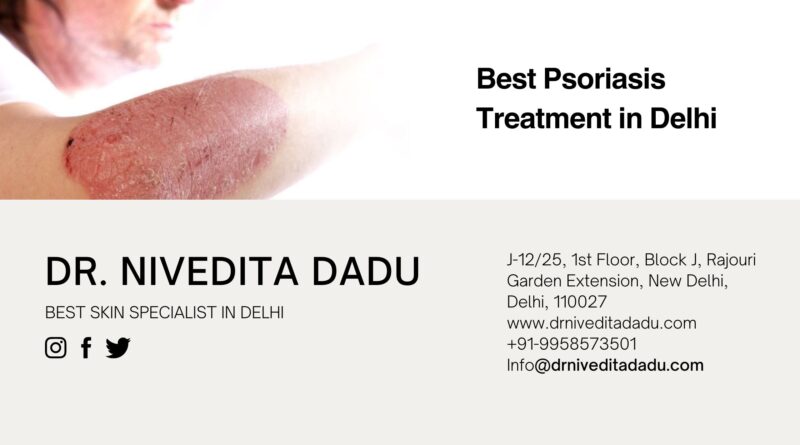Navigating Psoriasis: A Guide to Effective Treatments
Imagine a canvas once vibrant with colour, now marred by patches of red and white. This is the reality for those living with psoriasis, a chronic autoimmune condition that affects millions worldwide. While psoriasis can be physically and emotionally challenging, it’s essential to remember that one is not alone in this journey. This blog guides one in navigating the complexities of psoriasis treatment and where one can expect the best Psoriasis Treatment in Delhi. We’ll explore various options, from traditional medications to emerging treatments, empowering one to take control of their condition and reclaim their well-being. Let’s embark on this journey together, discovering the path to a brighter, healthier future.
Understanding Psoriasis:
Psoriasis is a chronic autoimmune disorder where the immune system mistakenly accelerates the production of skin cells, causing them to build up rapidly. This leads to the formation of thick, red, and scaly patches on the skin, which can be itchy and sometimes painful. Although the precise cause of psoriasis is not fully understood, it is widely believed to involve an overactive immune response that triggers inflammation and excessive skin cell turnover. Various factors, including genetic predisposition and environmental triggers, may contribute to the onset and exacerbation of this condition.
Common Symptoms of Psoriasis:
- Red, scaly patches on the skin
- Itching and burning sensations
- Dry, cracked skin
- Joint pain (psoriatic arthritis)
- Nail changes (thickening, pitting, or discoloration)
Factors That Can Aggravate Psoriasis:
- Excessive smoking: Tobacco use can exacerbate psoriasis symptoms.
- Alcohol consumption: Excessive alcohol intake may trigger or worsen psoriasis flare-ups.
- Infections: Infections, such as sore throats, can contribute to psoriasis flare-ups.
- Anxiety and emotional stress: Psychological factors can influence the severity of psoriasis.
- Certain medications: Some medications, including antihypertensives, antifungals, and antimalarials, may trigger psoriasis flare-ups in susceptible individuals.
- Obesity: Excess weight can increase the risk of psoriasis and worsen existing symptoms.
Treatments Available:
Modern dermatology offers a range of effective treatments for managing psoriasis and reducing its impact. These include topical therapies, oral medications, phototherapy, excimer lasers, and injectable biologics.
- Topical Therapy: Creams, lotions, and ointments can help reduce inflammation, scaling, and itching on smaller psoriasis patches. Common ingredients include salicylic acid, anthralin, tar, vitamin D analogs, and retinoids.
- Oral Medications: For severe psoriasis, oral medications like calcineurin inhibitors, anti-proliferative medicines, and retinoids may be prescribed. These should be taken under the supervision of a dermatologist.
- Phototherapy: Phototherapy involves exposing psoriasis-affected skin to UV light. It can be performed in a clinic or home under a dermatologist’s guidance. UVB is most effective, but both UVB and UVA are in sunlight. Follow the dermatologist’s instructions and schedule regular check-ups. Use sunscreen on unaffected skin. For enhanced results, combine UVA with psoralen (PUVA therapy).
- Excimer Laser: A newer treatment option, excimer laser therapy uses a high-intensity UVB beam for localized psoriasis. It requires 4-10 sessions, with at least a 48-hour gap between treatments.
- Biologics: Unlike traditional drugs, biologics target specific immune system components involved in psoriasis. Administered via injections or infusions, they’re effective for those who haven’t responded well to other treatments or face risks from alternative therapies.
Consult the Best Skin Specialist in Delhi for Psoriasis!
To get help, one can consult Dr. Nivedita Dadu, a renowned dermatologist at Dadu Medical Centre. The doctor is known as the best skin specialist in Delhi and can provide valuable support and guidance for those struggling with psoriasis. Her expertise allows her to offer various treatment options to help one manage the condition and feel more confident.

